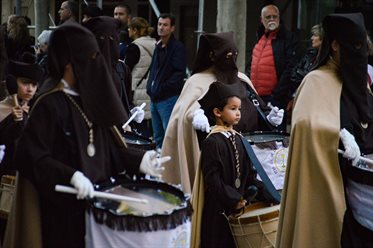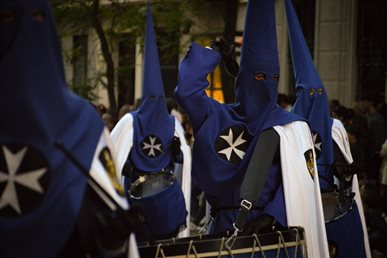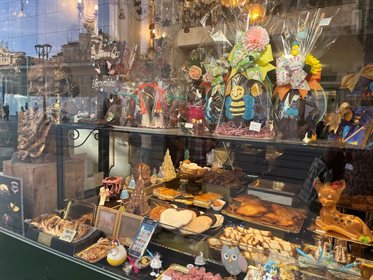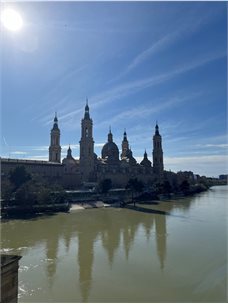Blog: Celebrating Easter in Spain
Written by Student Content Shaper, Mimi Curtis
Hey everyone!
I’m Mimi a Modern Languages student and one of the Student Content Shapers. Currently, I’m studying abroad in Zaragoza, Spain. I’m having such a great time improving my Spanish, meeting new people, and learning about different cultures and traditions.

Most Spanish people are Catholic, so Easter (or ‘Pascua’ in Spanish) is especially significant, not only on a personal and religious level but also culturally and historically. Traditions are specific to each region and start during Semana Santa (the holy week leading up to Easter Sunday). In Zaragoza, the Semana Santa has been declared of International Tourist Interest due to its 700 years of history.
Impressive Parades
The most impressive part of Semana Santa are the parades. They take place every day with each one linked to different brotherhood associations (‘hermandad’, which people may join due to family traditions or affinity to their local area.
Parade members form processions from their local church to the main cathedral in the centre of the city, carrying floats (‘pasos’) that depict different scenes from the Easter story. Zaragoza is known for its powerful drums from Bajo Aragón that makes the whole city vibrate and can make these processions seem intense.

Hooded costumes are worn specifically for the parades which can be a little shocking. The hoods, worn by ‘Nazarenos’, can take different colours and shapes but the ones you might have seen before from photos are tall and pointy (‘capirote’).
The exact origin on the hoods worn during Semana Santa isn’t clear but it’s thought that Easter is a time to reflect on the death of Jesus, so the parades are a sort of funeral procession where the hoods cover the faces in mourning.
However, an alternative origin could be that as Semana Santa is viewed by Christians as a time for repentance for their sins from the year, the capriotes could originate from the Spanish Inquisition. This is because during the Spanish Inquisition people who were arrested had to wear a paper version in different colours depending on their crime as a sign of public shame and humiliation. After the abolition of the Inquisition the hoods remained as a symbol of penitence.

Easter Treats
Much to my horror, chocolate Easter eggs don’t exist here! I religiously enjoy cream eggs and mini eggs from January, when they’re released in shops, up until my secret stash runs out in May. Unfortunately, there’s nothing quite like this in Zaragoza that can satisfy my cravings.
It’s not all doom and gloom though as I can enjoy various cakes and pastries from the local bakeries.
A very traditional cake is ‘La Mona de Pascua’ which originates from the regions of Catalonia and Valencia. These colourful and playful cakes celebrate the end of lent and the start of spring and are often topped with boiled eggs and marzipan.

One of the most popular sweet treats are ‘torrijas’ which are slices of bread soaked in milk and egg, fried in olive oil, and served with sugar or cinnamon (very similar to French toast). These are available nearly everywhere at this time of year but also very easy to make at home. Check out this recipe if you’d like to try it yourself.
Embracing new traditions
Although Easter in Spain has a stronger religious focus than the UK, it continues to be celebrated by everyone in the country. It is an opportunity to honour regional diversity and traditions with clothing and music.
A sense of community is very important. The parades draw everyone out to the streets to witness their beautyand sweet treats are enjoyed with the whole family. Easter is a time of reflection and repentance but also a celebration of spring and new beginnings.

I feel so lucky to have the opportunity to immerse myself in my new community away from home and experience these new traditions. I can’t wait to witness the parades myself and who knows, when I’m back in England, maybe I’ll trade out my creme eggs for torrijas!